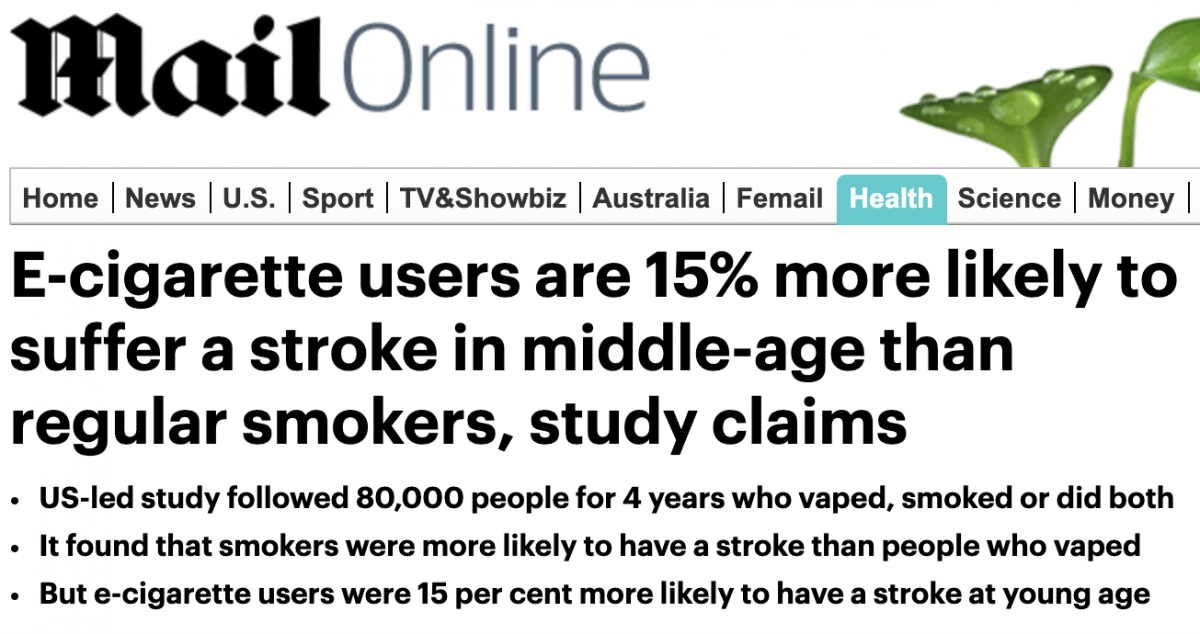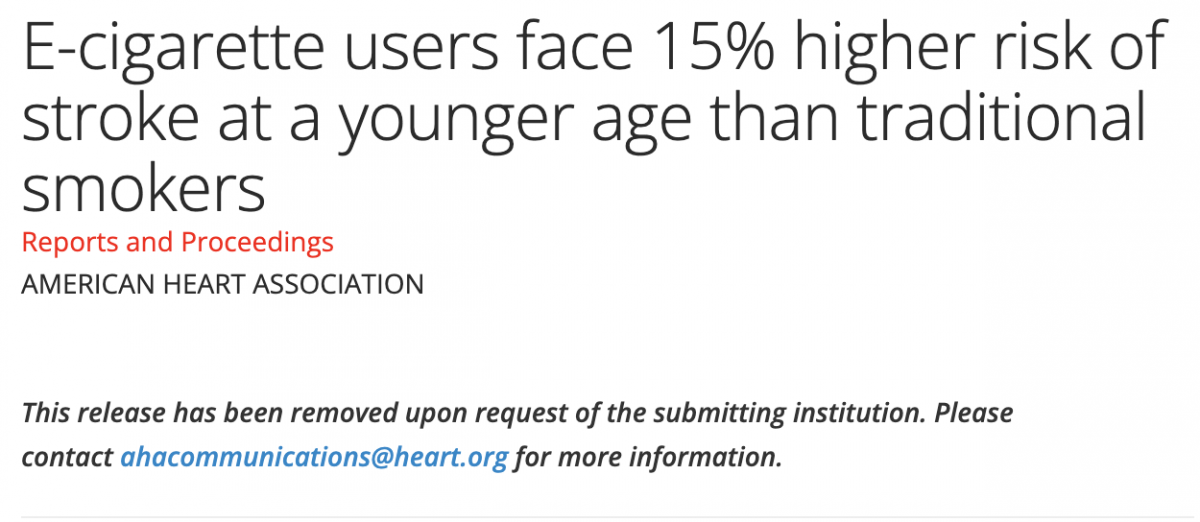“Adults who used electronic cigarettes had a 15% higher risk of having a stroke at a younger age when compared with adults who smoked traditional combustible cigarettes and despite the high risk of stroke with tobacco smoking,” wrote the AHA’s press office.
The study's co-lead author Urvish Patel is quoted as saying: “The public needs to know that the safety of e-cigarettes have not been proved to be safe and should not be considered as an alternative to traditional smoking especially among people with existing risk factors such as history of heart attack, high blood pressure and high cholesterol.”
The Daily Mail was just one media outlet that leapt on the release, screaming in bold font: “E-cigarette users are 15% more likely to suffer a stroke in middle-age than regular smokers, study claims”.

Professor Peter Hajek, Director of the Tobacco Dependence Research Unit, Queen Mary University of London (QMUL), commented: “This unpublished conference presentation seems to be based on the same fallacy as the infamous study that claimed that vaping causes myocardial infarction (MI). The MI paper was withdrawn when it transpired that most vapers had their MI before they started to vape. It is likely that e-cigarette users in this cohort were smokers who switched to vaping AFTER they suffered a stroke. Presenting this is if vaping caused these strokes is misleading and could put smokers off switching to vaping.”
Dr Jamie Hartmann-Boyce, Centre for Evidence-Based Medicine, University of Oxford, added: “Stroke was still far more common in people who smoked cigarettes than in people using e-cigarettes – people who smoked cigarettes were over 6 times more likely to have a stroke than people who used e-cigarettes.
“Experts continue to agree that, though not risk free, e-cigarettes are considerably safer than smoking, and people who smoke should consider switching. This study does not change that message.”
Professor Paul Aveyard, Professor of Behavioural Medicine at the University of Oxford, agreed: “This press release could equally and accurately be headed as ‘E-cigarette users six times less likely to have a stroke than traditional cigarette smokers’.
Prof Aveyard pointed out that there are several difficulties in interpreting this research, including that there, “is no biologically plausible hypothesis that might explain how e-cigarettes could increase the risk of stroke at young ages but decrease it in the older groups. It’s quite possible this is a chance finding.”
He concluded: “Stopping smoking and vaping is the best choice for health, switching to vaping the second-best choice, and continuing smoking the worst – and that maxim remains true.”

Dr Leonie Brose, National Addiction Centre at King’s College London, also felt the survey contained major flaws: “It is difficult to say without knowing more about the analysis; however, as far as I know, the survey they used is a cross-sectional survey. This means respondents had a stroke in the past (maybe years before they completed the survey) and were using e-cigarettes or smoking at the time of the survey. At least some of the strokes would therefore have occurred before e-cigarette use. The strokes then could not have been caused or made more likely by e-cigarette use. It may also be that people switched to e-cigarettes after a stroke to reduce the stroke risk from smoking which would explain the association between a past stroke and current e-cigarette use. In any case, many e-cigarette users will have been smokers before they started using e-cigarettes, so the analysis would have to take people’s past behaviour into account. From the press release, it is unclear if that was done.”
Finally, Professor John Britton believes that closer scrutiny of the findings is impossible due to the preliminary nature of the report, therefore “it is not possible to determine whether this finding is of any import.”
The Daily Mail chose to ignore that part of Prof Britton’s quote – just as it will shamefully ignore the AHA’s retraction.
Photo Credit:
Photo by Robina Weermeijer on Unsplash
Dave Cross
Journalist at POTVDave is a freelance writer; with articles on music, motorbikes, football, pop-science, vaping and tobacco harm reduction in Sounds, Melody Maker, UBG, AWoL, Bike, When Saturday Comes, Vape News Magazine, and syndicated across the Johnston Press group. He was published in an anthology of “Greatest Football Writing”, but still believes this was a mistake. Dave contributes sketches to comedy shows and used to co-host a radio sketch show. He’s worked with numerous start-ups to develop content for their websites.
Join the discussion
Expert Reaction to Pregnancy Study
Experts have reacted to the QML study of impacts of vaping in pregnancy and comparison with smoking
Study: Vapes Help Pregnant Quitters
A new study from Queen Mary University of London finds that vapes help pregnant smokers quit and pose no risk of poor pregnancy outcomes
IBVTA responds to UCL study
The Independent British Vape Trade Association has responded to University College London research and said the findings show the Government’s smoke-free ambition is stalling
Cochrane Review Echoes Swedish Success
The Cochrane Review echoes the Swedish approach, finding less harmful alternatives like vaping are superior to other quit methods, says Smoke Free Sweden











